NARRATION:Back in the deepest, darkest depths of time, there lived a great mathemagician called Hypatia. Numbers fell under her spell one by one. With them, Hypatia could do anything. Now Hypatia is looking for people to share her powers with. She has forged a mathematical maze. Only true mathemagicians can solve the puzzles and find their way out. Join two young explorers, Oliviaand Hassan, to solve the puzzles, escape the maze and become the greatest mathemagicians of all time.
Recognising and comparing fractions.
OLIVIA:Ah finally, a nice normal place. Oh, are you kidding me?
HYPATIA:Welcome to the pizza dimension.
ARCHIMEDES:I hope you like pizza because it's all there is.
HYPATIA:We've got margherita pizza.
HASSAN:Yum.
HYPATIA:Veggie pizza.
ARCHIMEDES:Yum.
HYPATIA:Pineapple pizza. And pepperoni.
HASSAN:Yum!
OLIVIA:Mmm.
HASSAN:Why are we in a pizza dimension?
HYPATIA:Haha well, let's just say this next question is about fractions. If you are ever to escape the pizza dimension and eat anything other than pizza again, first you must simplify 8/12. Now, to do this we Are you getting distracted?
OLIVIA AND HASSAN:Huh?
HYPATIA:Let's eat first, shall we?
OLIVIA:Hassan, would you like a slice of mine? I have four.
HASSAN:Only if I can give you a slice of mine.
OLIVIA:Yes, please.
HASSAN:Oh but I have eight little slices. It's not fair for you to give me such a big piece in return for one of mine.
HYPATIA:Are you thinking what I'm thinking?
ARCHIMEDES:This is far too much pizza, but they will probably eat it anyway?
HYPATIA:Yes, and also, here's how you compare and simplify fractions.
Let's take a pizza and make 12 slices.
ARCHIMEDES:Now if I take away two slices, there are 10 remaining. We can express this as a fraction.
HYPATIA:The pizza has been split into 12, which becomes the denominator. And there are 10 pieces we're interested in, which becomes the numerator. 10/12.
ARCHIMEDES:Now, let's divide this other pizza into six equal slices and take away one, expressing the fraction as 5/6.
HYPATIA:Notice anything about our two pizzas?
HASSAN:Although we are using different fractions, the remaining pizza is the same size in both cases.
ARCHIMEDES:This is because the numerator and denominator of 10/12 can both be divided by two. Five goes into 10 twice, as does six into 12. This is called simplification: Expressing a fraction with the smaller numerator and denominator. We could have a pizza with 60 equal slices and 10 missing, and it would still be the same proportion of pizza. We can express it as 5/6, as five fits into 50 10 times, as does six into 60.
HYPATIA:When working with fractions, all great mathematicians try to make the numerator and denominator as small as possible. In this case, 5/6.
OLIVIA:So, with my pizza, a slice is 1/4 as the pizza is in four parts?
ARCHIMEDES:Yes.
HASSAN:So if I give two slices, 2/8, I can simplify that as 1/4.
OLIVIA:As two and eight can both be divided by two.
HASSAN:So I can trade two slices for one of Olivia's.
HYPATIA:If you are ever to escape the pizza dimension, first you must simplify 8/12.
OLIVIA:Oh, to simplify 8/12, both are divisible by two, so we can make this 4/6.
Why is nobody cheering?
HYPATIA:I think you might have been a bit too hasty.
HASSAN:Oh, I know, eight and 12 are also both divisible by four.
OLIVIA:Ah, so the simplest fraction is actually 2/3, not 4/6.
HYPATIA:Correct!
HASSAN:I actually quite like pinapaaahhh
ARCHIMEDES:Oh, that was my dinner. Hypatia, can I some of youurrrr
HYPATIA:Simplifying fractions is great when you know how. Let's see how my young mathemagicians get on with simplifying these. 4/8, 2/3, 3/9, 2/4 and 6/18. Can you spot the odd one out?
Video summary
Olivia and Hassan are enjoying themselves in a world made out of pizza and learn how to work with numerators and denominators in fractions.
When Hypatia appears and asks them to find out the common factors of 8 and 12, and challenges them further to multiply the denominator and numerator by this number, Olivia and Hassan worry that they wonÔÇÖt be able to do it.
However, by using the slices of pizza, they work out how to work with numerators and denominators in fractions.
This short animated film is from the ┤¾¤¾┤½├¢ Teach series, Hypatia's Mathematical Maze.
Teacher Notes
Before watching the film:
Prior to this lesson you may wish to introduce pupils to other relevant topics, for example:
- Understanding that fractions need to have equal parts
- Multiplication and division
- Factors and multiples
During the film:
Depending on your lessonÔÇÖs focus you may wish to pause the film at certain points to check for understanding, asking questions such as:
- What does the denominator express?
- What does the numerator express?
- Does a larger denominator mean a larger fraction? How do you know?
Final question:Can you spot the odd one out?4/8, 2/3, 3/9, 2/4, 6/18.
Answer to the final question:
2/3 is the odd one out as it cannot be simplified further.
Following on from the film:
When looking at fractions as numbers, building fraction walls can help pupils understand about relative size and find equivalent fractions.
- Sort fractions into three categories such as smaller than 1/3 , equal to 1/3 , larger than 1/3.
- Place fractions along a number line between 0 and 1.
This short film is suitable for teaching maths at KS2 in England, Wales and Northern Ireland and 2nd Level in Scotland.
Adding and subtracting using mental methods. video
In a mythical temple full of obstacles, Olivia and Hassan learn simple mental maths and apply it to work out the passcode to open the door.
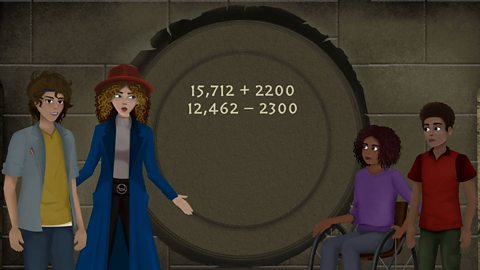
Adding and subtracting using written methods. video
Having been transported to a floating library, Olivia and Hassan's ability to solve large equations using written methods is tested.
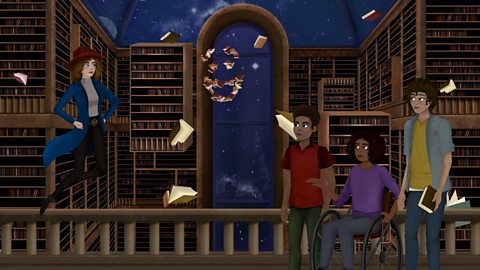
How and why we round numbers. video
Olivia and Hassan are taught how to round to the nearest 1000, 10,000, and 100,000 when a disgruntled magic carpet demands money from them.
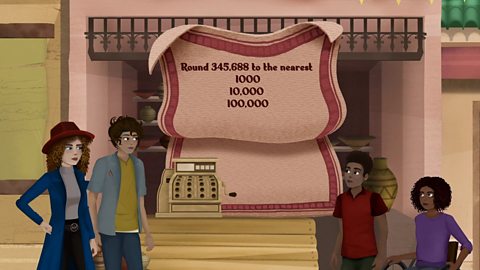
Using addition and subtraction in multi-step problems. video
Inside a giant computer created before the age of mathemagicians, Olivia and Hassan are faced with a multi-step problem to reach the labyrinthÔÇÖs next stage.
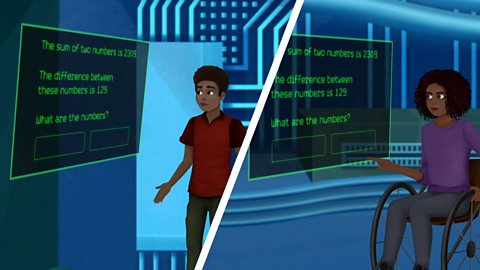
Multiplying by 10, 100 and 1000. video
When Olivia and Hassan find themselves on the roof of an enormous skyscraper they learn how to multiply by 10, 100 and 1000 and work out the number of windows on the building.
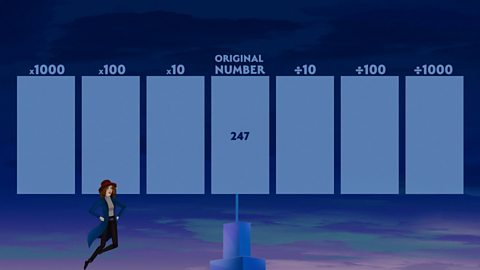
Mental multiplication. video
While exploring a jungle, Olivia and Hassan learn the true nature of square numbers as being created when two of the same number are multiplied together.
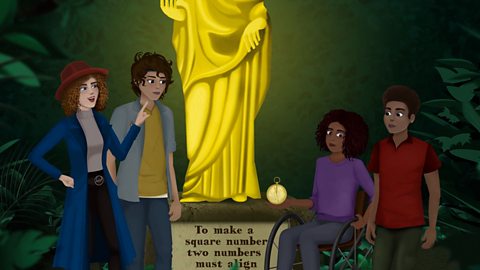
Factors, multiples and primes. video
Trapped in a desert together with Archimedes, Olivia and Hassan learn what common factors, multiples, and prime numbers are.
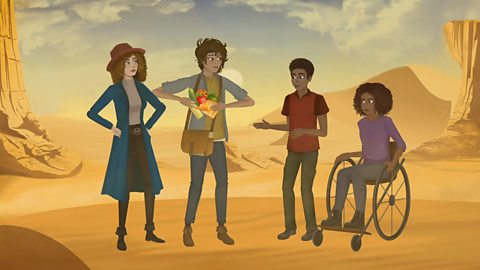
Multiplying using written methods. video
Finding themselves in space, Olivia and Hassan watch mathemagician Hypatia perform long multiplications in the sky by bending the stars.

Dividing using written methods. video
Olivia and Hassan learn how to perform long division in order to free gridlocked traffic on a bridge.
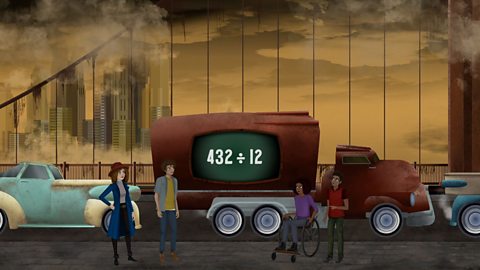
Adding and subtracting fractions. video
Amongst the ruins of an ancient city, Olivia and Hassan learn how to add and subtract fractions.
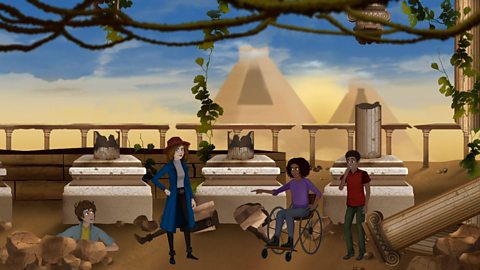
Multiplying and dividing fractions. video
In a mysterious crystal cave, Olivia and Hassan get to work dividing and multiplying fractions in order to find their way out.
